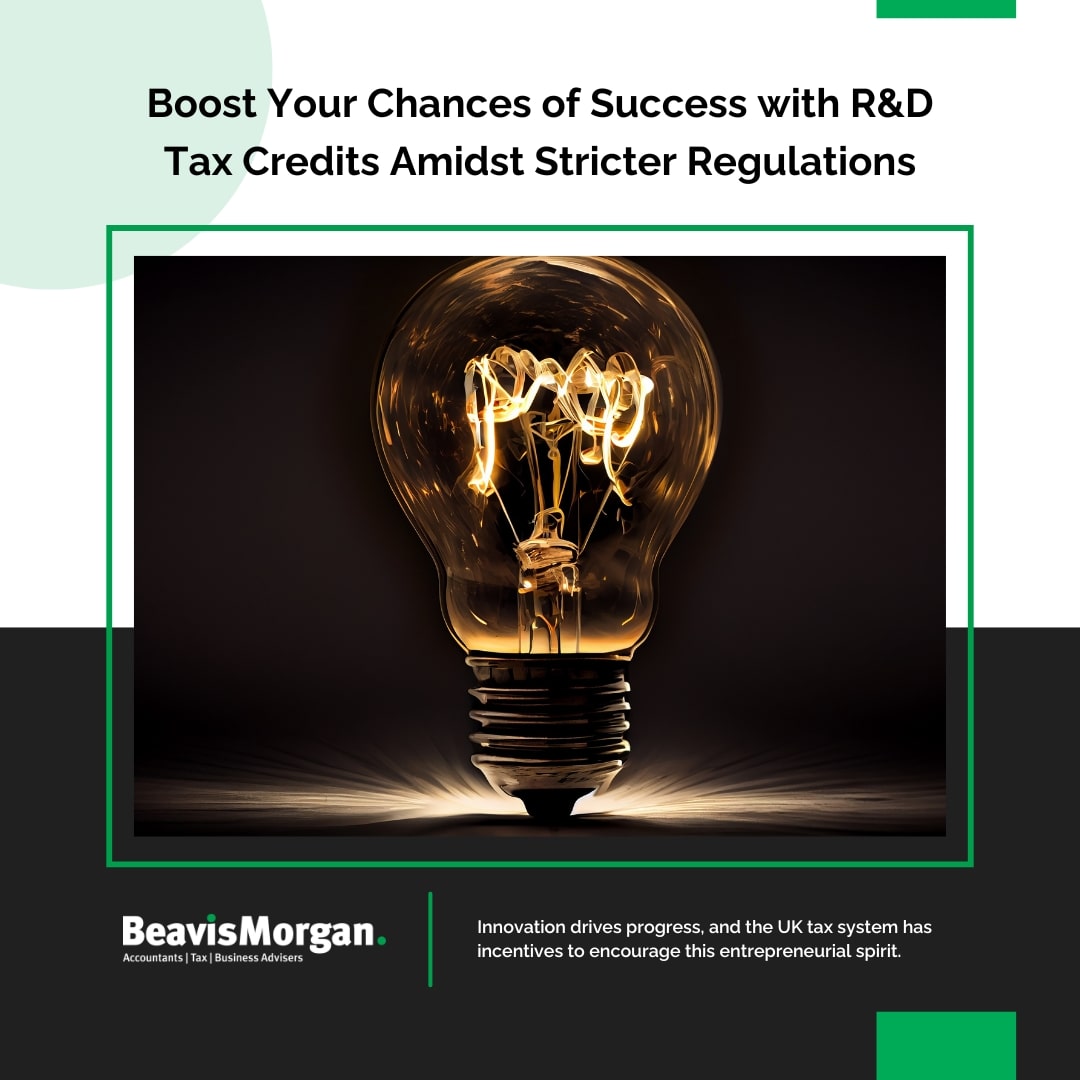Advice from Rebecca Heap, R&D Tax Relief expert within Beavis Morgan’s specialist R&D team
Innovation drives progress, and the UK tax system has incentives to encourage this entrepreneurial spirit. In this article, Rebecca Heap delves into the intricacies of R&D tax relief, the recent changes, and how small and medium-sized enterprises (SMEs) can still successfully claim these incentives despite heightened scrutiny.
What Are R&D Tax Credits?
R&D tax credits have long been a key incentive for businesses investing in innovation. These credits provide significant tax relief for companies pushing the boundaries in science or technology. Despite recent adjustments to the claimable amounts, they remain a lucrative opportunity for businesses committed to research and development.
Sweeping Changes to the R&D Tax Credit Scheme
1 April 2024 marked a significant shift with the SME scheme merging into the RDEC (Research & Development Expenditure Credit) tax relief scheme. This unified scheme operates at a 20% rate, translating to a net corporation tax relief of 15% against qualifying R&D expenses. This will apply to accounting periods commencing on or after 1 April 2024. However, R&D-focused SMEs that incur qualifying R&D expenses amounting to at least 40% (from 1 April 2023) or 30% (for accounting periods starting on or after 1 April 2024) of their total expenditure and are loss-making before tax relief can claim an enhanced tax relief at 86% and surrender losses at 14.5%. This translates to a benefit of 27% of qualifying R&D expenditure.
HMRC’s Crackdown on Non-Compliance
The landscape of R&D tax credits is undergoing transformation as HMRC intensifies its fight against erroneous and fraudulent claims. In response to a spike in non-compliance, HMRC has bolstered its compliance team and established a dedicated Anti-Abuse Unit. Now, approximately 20% of claims face scrutiny, and the bar for proving the uniqueness of R&D activities has been raised.
Navigating the Tightened R&D Tax Claims Environment
The ramifications of HMRC’s crackdown are evident, with mandatory reporting requirements and digital submission of the ‘Additional Information Form (AIF)’ now part of the process. Accountability rests squarely with businesses, not the advisors who submit the claims, amplifying the need for due diligence when selecting an R&D tax advisor.
Strategies for Success with R&D Tax Credits
- Stay Informed: Keeping abreast of the latest R&D tax credit rules and regulations is vital. Beavis Morgan provides the expertise to navigate these complexities, ensuring your claims align with current legislation.
- Document Rigorously: Strong documentation is your best defence against HMRC scrutiny. Maintain comprehensive records of your R&D projects, including technical uncertainties and developmental milestones.
- Select Advisors Wisely: R&D tax credit claims are nuanced, requiring specialised knowledge. Ensure your advisors are not only experienced but also regulated, adhere to professional standards and can offer support in the event of an HMRC enquiry.
- Prepare for Due Diligence: Given the heightened regulatory focus, prepare for potential audits by ensuring your R&D claims are robust, transparent, and fully substantiated.
- Engage with Experts: Consider leveraging the services of reputable firms like Beavis Morgan, which can provide the necessary expertise and support to maximise and safeguard your R&D tax credit claims.
Despite the tougher stance on R&D tax relief, SMEs engaging in genuine innovative activities should confidently claim their rightful incentives. Being a regulated practice, Beavis Morgan is in a unique position to advise businesses in optimising benefits from R&D tax credits while remaining compliant. In addition, unlike many R&D consultancies, we can file Corporation Tax returns on your behalf.
Our team stands ready to guide you through the complexities of R&D tax claims and help you secure the relief that fuels your innovation.
For more information and personalised advice on R&D tax credits, contact Rebecca Heap or your usual Beavis Morgan partner. Alternatively, please email info@beavismorgan.com.

